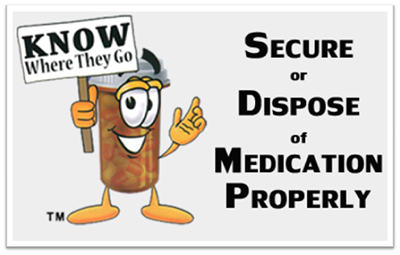 Properly disposing of unwanted medications may be inconvenient, but there are some very important reasons to do this in a safe and responsible manner.
Properly disposing of unwanted medications may be inconvenient, but there are some very important reasons to do this in a safe and responsible manner.
It’s your environment. Please don’t flush!
Drugs that are flushed down the toilet cannot be removed by the sewage treatment plants or septic system processes. These substances are released into waterways which can lead to contamination of surface and ground water. Septic tank systems may release the pharmaceuticals into the soil, from which they may reach the ground water.
Abuse is widespread!
Abuse of prescription drugs, particularly painkillers, has increased among teenagers and young adults due to the ease of obtaining drugs. Sixty percent of the persons who abuse painkillers indicate that they received the drugs free from friends or relatives.
You can make a difference!
Children, pets, and scavenging animals could find the medication and swallow it. Drugs could be scavenged and illegally sold. Take action to minimize the threat of accidental poisoning or drug abuse. Let’s take steps now to avoid harm to future generations and the environment.
Your participation is appreciated!

For more information please call (435) 657-3264.